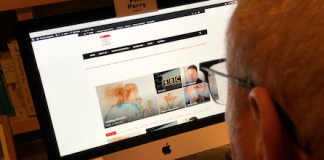- Crime pays - 1st July 2025
- Disabling protests - 30th June 2025
- A good storybook - 30th June 2025
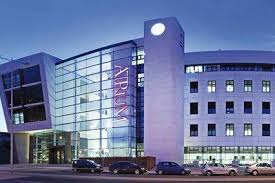
A controversial Welsh university has startlingly admitted certain students will be offered unconditional places, against the strong advice of UK officials, The Eye can reveal.
In an internal email we have seen the huge University of South Wales (USW) has insisted that pupils predicted to secure certain A-levels will receive automatic offers.
The email states: “Any students with predicted grades of BBC or above will automatically receive an unconditional offer.

“Those below will be offered conditional places if found to be suitable”.
But this flies in the face of key events.
In March last year Clare Marchant, the head of the Universities and Colleges Admissions Service (UCAS), said the higher education sector needed to have an “open and honest” debate about unconditional offers after figures showed a 40 per cent rise in them the year before, and that this was a “concern”.
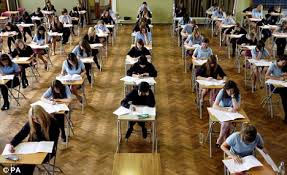
In 2017, more than 50,000 students were offered unconditional places, raising fears universities were using the practice to secure student fees of thousands of pounds, to the detriment of some pupils.
In the summer of last year it was reported that the number of students receiving unconditional offers for university places had leapt on the previous year.
It prompted calls for an overhaul of the UK’s convoluted and unreliable university admissions process.
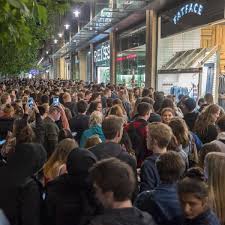
UCAS figures showed that nearly one in four 18-year-olds applying from England, Wales and Northern Ireland had received an unconditional offer – meaning they can accept an undergraduate place without meeting the A-level or BTech grades predicted by their teachers.
According to the statistics, 23 per cent of that year’s cohort had been made at least one unconditional offer.
In 2016 the proportion was a little under 13 per cent, and in 2013 it was just 1 per cent – meaning the number of students benefiting had risen from 2,500 five years ago to 58,000 last year.

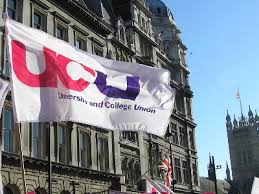
Even the prediction of grades for school-leavers has come under fire.
A study from the University and College Union (UCU) said no other developed country uses such a system of forecasts of results for university admissions, and lecturers stressed that most predicted grades turned out to be incorrect.
A study from the UCU had examined admissions systems from 30 major countries and found no others using the UK’s approach of pupils applying on the basis of grades predicted by their teachers.

Head teachers have also backed calls for a change, with their organisation saying the current approach is “no longer fit for purpose”.
The controversies are set against a disturbing background, as universities are accused of fuelling fears over grade inflation.
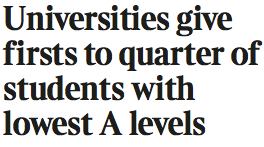
Analysis by The Times showed that more than 2,000 students who had achieved three D grades or lower at A-level ended up being awarded a first-class degree at university.
Forty universities awarded firsts to at least a quarter of those with the lowest A-level grades.
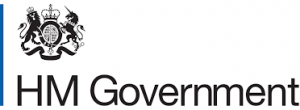
Damian Hinds, the UK Education Secretary, told universities last month that they must end the steep rise in “unjustifiable” first-class degrees, with the percentage of students getting them increasing from 16 to 27 per cent in the past six years.
A few months ago an investigation by the Office for Students found that most universities had unexplained increases in firsts awarded in the six years to 2017.

The Augar review of higher education, commissioned by the Prime Minister, is understood to be considering banning those with the poorest A levels, such as three Ds, from taking out student loans.
Data from the Higher Education Statistics Agency showed that out of 274,000 students graduating in 2017, 11,250 achieved three D grades or lower and 2,060 of those got a first.

USW is the second biggest university in Wales (after Cardiff University) with 23,465 students enrolled in the academic year 2016/17.
Officials there say “At the University of South Wales, it’s all about being bold, independent and fulfilling your potential“.
But presumably it’s difficult to guage the potential of students if tutors are told they will “automatically receive an unconditional offer”.
 Our Editor Phil Parry’s memories of his extraordinary 35-year award-winning career in journalism as he was gripped by the incurable disabling condition Hereditary Spastic Paraplegia (HSP), have been released in a major new book ‘A Good Story’. Order the book now. The picture doubles as a cut-and-paste poster!
Our Editor Phil Parry’s memories of his extraordinary 35-year award-winning career in journalism as he was gripped by the incurable disabling condition Hereditary Spastic Paraplegia (HSP), have been released in a major new book ‘A Good Story’. Order the book now. The picture doubles as a cut-and-paste poster!










